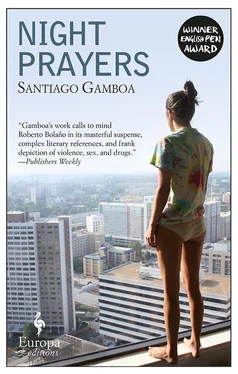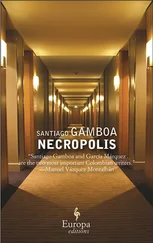I, on the other hand, never told him I painted graffiti. That was a secret world, the one closest to my heart, and I could only share it with Juana. Several times he asked me, what about you, man, don’t you write? how can you not write if you like novels so much? not even poetry? and I’d say, I prefer reading, I’m very passive or very cerebral, I like to contemplate the world from a distance, to see without being seen, it’s an idea of the sublime I read about later, Consul, the sublime as the terrible seen from a safe place, that was the kind of thing I said to Edgar when, guessing that I had secrets, he started asking questions.
When we heard that David Foster Wallace had committed suicide, Edgar dressed all in black and invited me over to his house. He looked pale. We stole a bottle of Martini from his father’s bar, along with four packs of salt and vinegar potato chips imported from England, a jar of high-quality tuna, and a Dutch cheese, and went to Usaquén Cemetery to throw a dinner in his honor. Edgar took with him a couple of original editions. I had managed to get hold of Spanish versions of A Supposedly Fun Thing I’ll Never Do Again and Brief Interviews with Hideous Men , which according to Edgar were amazing in the original. As I already said, I had a complex about the fact that I didn’t know English. Or rather: that I didn’t speak it as naturally and resonantly as the people from bilingual schools. I could say everything, using few words, but reading literature was frustrating. On every line I’d find things that I understood well enough from the context, but that left me with the feeling I was missing the most important part.
To get into the cemetery you had to go around the wall and along a side passage until you came to a garage door that was always kept shut. It was a barred door and you could climb over it and jump down on the other side. That’s what we did.
Edgar liked the upper part of the cemetery, toward the hills, adjacent to the parking lot of a supermarket, because there was a series of graves without stones, with names written by hand on fresh cement. One of them said: “My son.” There we sat down and opened the bag of food. We ate and drank toasts to the soul of David Foster Wallace, inviting him to this poor, simple cemetery in a poor, simple country in one of the poorest and simplest regions of the world. We kept passing each other the bottle of Martini until we were drunk. We staggered around, sang, cried out the titles of Wallace’s books, and, incredibly, I felt free, so free it made me dizzy. I would have been capable of anything, however absurd or impossible. I could have run to the top of the hill and left that city forever.
To make things more exciting, Edgar rolled a joint and we took great puffs at it, and when we finished it we read out loud, and at that moment a gust of wind knocked over our plastic cups and Edgar cried, he’s here! it’s Wallace! We welcomed him with a bow and a few more drinks.
My head was spinning and I started throwing up, which forced me to move away; being young, that kind of thing embarrassed me. He was rich, free, brought up to do as he pleased, while I concealed a little hell in my house. I was shy. When he appeared, I told him I’d gone to take a leak and had felt the need to be alone. He said, sure, brother, I understand, but we finished the bottle and the joint, and we went home.
His brothers and sister were in their respective rooms, but they gave us more grass and half a bottle of aguardiente, so we started consuming all that while listening to “Bohemian Rhapsody” by Queen. I loved that song and I confess, Consul, that in those years I thought it had been written for me, just for me.
You remember the bit that says:
Is this the real life?
Is this just fantasy?
Caught in a landslide
No escape from reality
Open your eyes
Look up to the skies and see,
I’m just a poor boy (Poor boy), I need no sympathy
I never understood why Edgar, who was neither poor nor unhappy, liked it so much. He played at being a tormented, anguished spirit, at odds with the world, but in reality there was nothing to torment him, let alone anything to be at odds with, in the world or anywhere else. Reality was generous to him. When I told my sister, she said: rich people always think up ways to be depressed. They like being unhappy. It’s very elegant to be sad.
To go back to that night: at two in the morning, listening to Queen and reading David Foster Wallace, drinking aguardiente as if it was water, already drunk, until I realized I was about to faint. So I went to the bathroom, turned on the shower, and stuck my head in, hoping the water would cleanse me, and in fact it did me good and I even felt pleasure in those cold drops running over my neck and down my chest. When I finished, I had the shock of my life: there was Gladys, watching me. She was wearing a short T-shirt that left her navel free and a blue Gef thong.
Are you very drunk?
It’s passing, thanks, but she said, come to my room. I repeated that I felt better but she insisted, grabbing my arm and pulling me down the corridor. Her room was bigger than Edgar’s and looked out on the garden; music was playing that I didn’t know, some kind of French rap. With her was a guy, also in underpants, different than the one we had seen in the shower. Gladys told him I wasn’t feeling well, that I was drunk, and the guy took out a little bag of coke, prepared a line on a mirror, and offered it to me. Take this, breathe it in well, he said. Then he prepared four more lines for the two of them. At first I didn’t feel anything, but then a wave of well-being swept over me. I left the room, thanking them, and went back to Edgar’s room, he’d fallen asleep with his flies open, wearing a pair of dark glasses and the headphones from his iPad, connected to the YouJizz porn site, the Asian Amateurs section.
In spite of the fact that, deep down, Edgar and I knew we weren’t equals, it was a respectful friendship. I told him all about my life, and the only thing he said was, shit, if I’d experienced all that I’d be a novelist, and a poet for sure. Basically, you’re very lucky, brother. An unhappy childhood is the best gift a writer can have. I’m going to have to approach it from the other side: either do things in the style of Carlos Fuentes or reject my family and my class, like Bryce Echenique. Those are my two options. Otherwise, I’m fucked, but you’re made for life.
I looked at him sarcastically and said, the problem, brother, is that I’m not a writer.
Because Edgar, Consul, was fully aware of his vocation, even though he hadn’t written a thing yet or only short fragments. He liked to say, quoting Monterroso, “fragment: genre much used in ancient times.” To me, it was all a great mystery: his self-confidence, his amazing cultural knowledge given that he was so young, his extravagant and sometimes brilliant ideas, ideas he didn’t share with anybody but me, which can’t have been very stimulating for him. That’s how he was, Edgar Porras, young millionaire and intellectual who wanted to know a suffering he didn’t have, and maybe that’s why, Consul, he chose me, his exact opposite, as his friend. But I couldn’t choose. A poor person can’t choose to be rich, not even as a game.
I remember one of his stories. He told it to me several times, changing a few details. I don’t know if he wrote it in the end. It went like this: A young man from Bogotá was having a sex chat with a woman named Asaku, presumably Japanese. Asaku put the computer on her windowsill and sat down there, opened her legs and put things inside her, the necks of bottles, cucumbers, plastic dragons. The young man was jerking off like crazy, excited by the fact that Asaku, unlike the girls he knew, had lots of pubic hair, which seems to be a tradition in Japan, or at least that’s what he thought.
Читать дальше












